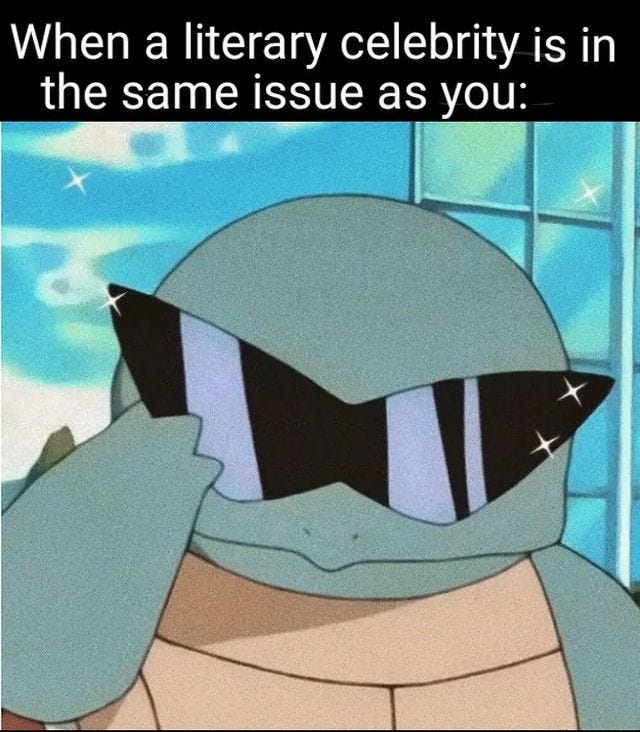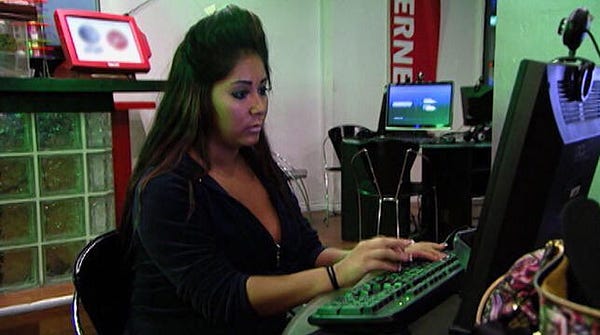Poets Go Pop! A Brief Interview with the Anonymous Folks Behind IG's @poetrymeemees
We keep it mysterious but we also keep it real in this interview with niche poetry meme creators @poetrymeemees
Today I’m jazzed to bring you an interview with the creators of the hilarious @poetrymeemees Instagram account.
Usually when I’m scrolling through Instagram, the memes I see are super general or targeted toward current events, zeitgeisty-y television, or utterly absurd far-out-thereisms. But sometimes a meme from @poetrymeemees pops up and I feel like someone I know very closely has made something special just for me.
Some of the memes verge on wholesome, and remind us of how we feel in those rare moments of poetic “success” (whatever that is):
But more than anything, the anonymous creators behind the account have the bitchiness of your best friend from your writing program cohort and aren’t afraid to point to some hard truths about the poetry community and so-called po-biz.
I admire the work that the creators of this account are doing to highlight the good, bad, and ugly parts of contemporary poet-hood, all through the so-called “low culture” medium of memes, so I reached out to ask them a few questions they graciously agreed to answer. In true internetty form, this exchange is anonymous. It has also been lightly edited for clarity, concision, and formatting.
Brief Interviews with Mysterious Poets: @poetrymeemees
Caitlin Cowan: Are you a poet?
@poetrymeemees: Yes. Two of us run this account and we are both poets.
CC: You don’t post only about poetry: you also make a lot of memes about what it’s like to be a practicing poet in the world today (submitting to contests, sitting in workshops, etc.) I felt wildly seen by these memes when I first came across your account. What is it about being a poet in this era that makes memes about the “lifestyle” (whatever that is) so cathartic, do you think?
@pm: What’s there not to mock about poets? We’re all thirsty for those lit mag pages—why tho? Name a person without an MFA who reads lit mags? Don’t even get us started on how the book contest system makes every press indistinguishable from the next—choosing the same five types of books year after year.
CC: Do you consider memes to be part of pop culture? Why or why not?
@pm: Yes, memes are very algorithmic, which means they are a part of pop culture.
CC: Do you have a favorite poem or poet that crops up in a tv show, film, or song? What about its appearance delights you? If not, what’s a poem you love that you’d like to see used in a film, on TV, in a song, or elsewhere in the pop culture ether?
@pm: [Muriel Rukeyser’s] “The Ballad of Orange and Grape” shows up in an early episode of Buffy the Vampire Slayer. The swim team turns into sea creatures. [Check out Season 2, Episode 20, “Go Fish.”]
I ask him : How can we go on reading and make sense out of what we read? – How can they write and believe what they're writing, the young ones across the street, while you go on pouring grape in ORANGE and orange into the one marked GRAPE –? (How are we going to believe what we read and we write and we hear and we say and we do?) —MURIEL RUKEYSER
CC: What do you think of the poet/the poem meme that was circulating just before and during the pandemic?
@pm: Never saw it until now.
Poets are too afraid of coming across a little ugly—we’re all a little bit pageant queen.
CC: Your account could reasonably be described as ultra-niche (and I love it, but I’m in the niche!) I’m interested in instances of poetry in popular culture because I think such interventions have the potential to mint new readers. But invariably, increasing the reach of poetry has the potential to alter the way that poets, poetry, and the public interact. Are there things that you enjoy about the “intimacy” of poetry as an art form and as a community? On the other hand, do you think there are positives to increasing the approachability of poetry in our culture?
@pm: No, I can’t say I feel any enjoyment from the poetry community.
CC: Do you mean to say that you enjoy poetry but not the poetry “community?” What’s the worst thing about it? What do poets get wrong about community? About poetry?
@pm: I kind of dislike poetry too. (Heyyy Marianne Moore! Heyyy Ben Lerner!) Most of it keeps no room for uncertainty or ambiguity. I want to sit with something I haven’t figured out yet, but instead I read poem after poem that says things we all kind of agree on. Poets are too afraid of coming across a little ugly—we’re all a little bit pageant queen.
And hero worship. Like good for the people winning a Honickman or being published by BOA—I’m super proud of all you—but God we gotta stop trying to write the same tepid book over and over again. I just feel like the type of literary celebrity obsession poets develop really narrows the scope of what's acceptable expression within the genre.
I feel like the poetry community is entirely predicated on people being upper middle class, professors/grad students, normative, and white. All “community” events and actions take this as understood so when poets don’t fit this, we are locked out.
Don’t have time to read all our back issues and think about our magazine’s subtle aesthetic differences because you work two jobs and are exhausted? Tough. Can’t spend $380 for a pass to AWP? Sucks for you. Can’t take off two weeks from work for a writing retreat/residency? Get fucked… but these are the only “legitimate” ways community is built in the academic poetry world.
Also, poets need to listen to better music, like better art, and enjoy better films. Also wear less beige (literally and metaphorically).
You heard them: get out there and get ugly. And throw out that beige cardigan! To get more poetry memes in your feed, follow @poetrymeemees on Instagram.










